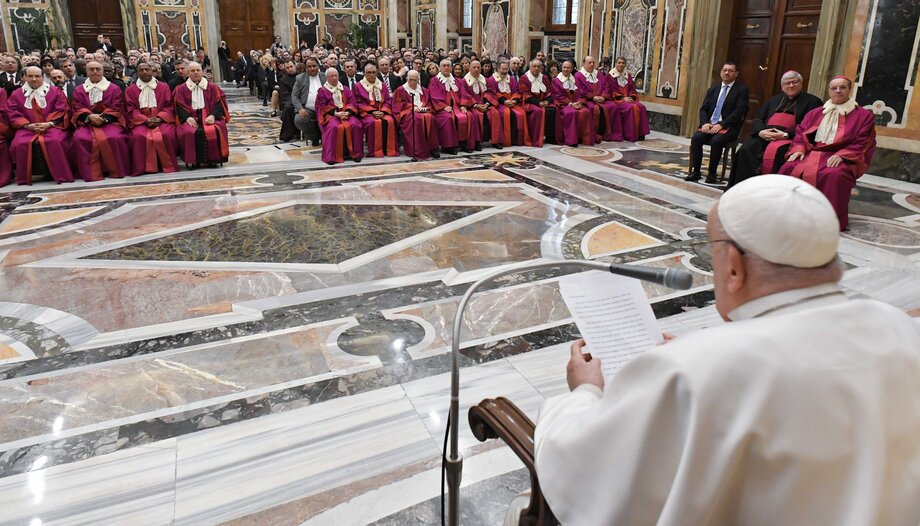At the inauguration ceremony, the Pope gave a speech on speech before the judges of the Tribunal of the Rota, in which he reflected especially on the theme of discernment.
Discern to judge
"I propose to focus on that specific discernment that it is up to you to carry out in matrimonial proceedings, concerning the existence or non-existence of causes for declaring null a married couple. I am thinking of your collegial trial at the Rota, of the trial conducted by the local collegial tribunals or, where this is not possible, by the single judge assisted perhaps by two assessors, as well as the pronouncement issued by the diocesan bishop himself, especially in the shorter processes, in consultation with the instructor and the assessor," Francis specified.
The Holy Father also pointed out that some measures, such as "the elimination of the requirement of a double sentence of conformity in cases of nullity, the introduction of the shorter trial before the diocesan bishop, as well as the effort to streamline and make more accessible the work of the tribunals." should be understood within the framework of "mercy towards the faithful in problematic situations" and not "be misinterpreted", so that "the need to serve the faithful with a pastoral care that helps them to understand the truth about their marriage must never be neglected".
In this regard, the Pope quoted the proem of his motu proprio "Mitis iudex Dominus Iesus", in which he said that "it is a matter of favoring 'not the nullity of marriages, but the celerity of the processes, no less than a just simplicity, so that, because of the delay in defining the judgment, the hearts of the faithful who await the clarification of their state may not be oppressed for a long time by the darkness of doubt'.
Mercy and justice
In this regard, the Pope pointed out that it is important to combine mercy and justice. "Precisely in the light of mercy, towards people and their consciences, judicial discernment about nullity is important," the Pope stressed, then quoting St. Thomas Aquinas: "Mercy does not take away justice, but is the fullness of justice."
However, Francis recalled that making a judgment is a very complicated task. "Reaching moral certainty about nullity, overcoming the presumption of validity in the concrete case, implies carrying out a discernment to which the whole process is ordered, especially the preliminary investigation. Such discernment constitutes a great responsibility that the Church entrusts to you, because it strongly influences the life of individuals and families."
"If someone does not pray, let him resign."
On the other hand, the Pope pointed out that judging a case cannot be done without "counting on the light and power of the Holy Spirit. Francis then added that if any of the judges do not pray, it is preferable that they stop their work: "Dear judges, without prayer you cannot be a judge. If someone does not pray, please, let him resign, it is better that way".
The Holy Father also pointed out the importance of being objective in judging, and of "being free from any prejudice, whether for or against the declaration of nullity." "This implies freeing oneself both from the rigorism of those who would claim absolute certainty and from an attitude inspired by the false conviction that the best response is always nullity, what St. John Paul II called the 'risk of a misunderstood compassion [...], only apparently pastoral,'" the Pope added.
Prudence and fairness
Francis then pointed out two virtues necessary for the discernment of Thursdays: "prudence and justice, which must be informed by charity. There is an intimate connection between prudence and justice, since the exercise of prudentia iuris aims at knowing what is just in the concrete case. A prudence, therefore, that does not refer to a discretionary decision, but to a declarative act on the existence or non-existence of the good of marriage; therefore, a juridical prudence that, to be truly pastoral, must be just. Just discernment implies an act of pastoral charity, even when the sentence is negative".
In conclusion, the Pope stressed the importance of the indissolubility of marriage and that, therefore, "discerning the validity of the bond is a complex operation, with regard to which we must not forget that the interpretation of ecclesiastical law must be made in the light of the truth about indissoluble marriage, which the Church safeguards and spreads in her preaching and mission. As Benedict XVI taught, 'the interpretation of canon law must be made in the Church. It is not a mere external, environmental circumstance: it is an appeal to the very humus of canon law and the realities it regulates. 'Sentire cum Ecclesia' has meaning also in the discipline, because of the doctrinal foundations always present and operative in the juridical norms of the Church'. This I ask of you, judges: that you listen with the Church".
Francis concluded by asking the judges of the Rota to pray for him, since his ministry is also complex. "Sometimes it is fun, but it is not easy," the Pope indicated, after commending the work of the tribunal to the Virgin Mary.













